Part 5: November 14 Broadcast

You are listening to BBC radio 4. In an hour, our correspondents will be holding a special interview with the ambassador to Iran discussing continued western interference as a double edged sword in the Middle East. For the next hour, Professor David Stephenson will be presenting a documentary on the second 80 years war of the eighteenth century. This series will be running every third day, up to 50 episodes. If you want news of the current war in the Middle East please channel in to BBC radio 1.
 Good evening, and welcome to BBC radio 4. I’m professor David Stephenson, professor of Dutch historical studies at Cambridge. This is the fifth part of our 50 episode special on the second 80 years war over Europe. Joining me for these broadcasts are fellow researchers and scholars Doctor Albert Andrews, specialist in German studies from the Berlin academy, Professor Robert Lowe, specialist in French studies at Cambridge, and a graduate student and technical assistant, Anton Thatcher. Last week, we discussed the start of the Dutch industrial revolution.
Good evening, and welcome to BBC radio 4. I’m professor David Stephenson, professor of Dutch historical studies at Cambridge. This is the fifth part of our 50 episode special on the second 80 years war over Europe. Joining me for these broadcasts are fellow researchers and scholars Doctor Albert Andrews, specialist in German studies from the Berlin academy, Professor Robert Lowe, specialist in French studies at Cambridge, and a graduate student and technical assistant, Anton Thatcher. Last week, we discussed the start of the Dutch industrial revolution. In the midst of the peaceful years, the 1709 elections were held. William the third and his cabinet were ineligible for the running, as they had successfully held office twice. However, the Orange party had left a massive advantage for Jacobus van Buren, the new leader of the Orange party. They were able to defeat the Republican Party with a 75% vote at the ballots, partly because the opposition party hadn't bothered to show up to the debate at all.
In the midst of the peaceful years, the 1709 elections were held. William the third and his cabinet were ineligible for the running, as they had successfully held office twice. However, the Orange party had left a massive advantage for Jacobus van Buren, the new leader of the Orange party. They were able to defeat the Republican Party with a 75% vote at the ballots, partly because the opposition party hadn't bothered to show up to the debate at all.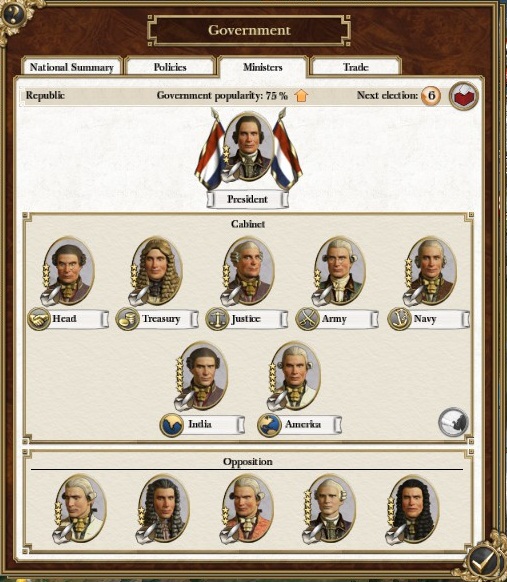
The 1708 Orange party and their opposition. Statholder Jacobus van Buren held considerably less power than William the third due to the peace in Amsterdam.
 New and inexperienced compared to William’s cabinet, the minister of defense Adelbert van Antwerp was sacked from his postion only 6 months into office. Herbeert Bakelar, a former colonel of the invasion of France, and Ouwerkerk’s private secretary was given Adelbert’s position, which he proved himself vastly more competent in. The remainder of his cabinet was not quite up to par with William’s, but were now up to task. Antwerps incompetence had nearly caused them to lose control over France due to severe bureaucratic tangles before he was replaced, though to be fair, no Dutch defense minister before him had the sole responsibility of defense policy over so large a land mass.
New and inexperienced compared to William’s cabinet, the minister of defense Adelbert van Antwerp was sacked from his postion only 6 months into office. Herbeert Bakelar, a former colonel of the invasion of France, and Ouwerkerk’s private secretary was given Adelbert’s position, which he proved himself vastly more competent in. The remainder of his cabinet was not quite up to par with William’s, but were now up to task. Antwerps incompetence had nearly caused them to lose control over France due to severe bureaucratic tangles before he was replaced, though to be fair, no Dutch defense minister before him had the sole responsibility of defense policy over so large a land mass.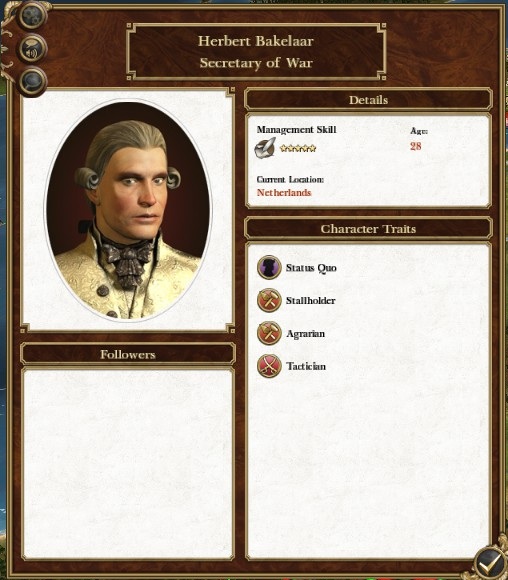
Bakelar was one of William's cronies, and a firm associate of Ouwerkerk, but was fortunate to have talent fit for his status.
 The time for an election within the Netherlands had marked a peaceful time of transition, the citizens more interested in their own politics. In particular, the question was what was to be done in France?
The time for an election within the Netherlands had marked a peaceful time of transition, the citizens more interested in their own politics. In particular, the question was what was to be done in France?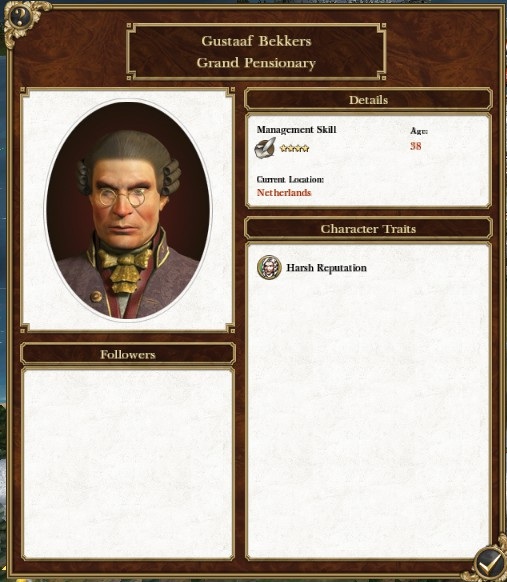
Beckers was put in charge of reforming France. He was considered unduly harsh, as he was more than willing to make an example of a few rebellious citizens, but his policies in the end heavily favoured the majority of the citizens.
 The answer was establishing parties from the French intellectuals known to be opposed to the French monarchy, and favourable towards Dutch interests. They forced their bill of rights and constitution to the French countryside, and installed a cabinet, where much like in the Netherlands, rich business men and factory owners held the voting capacity. Finally, the parties sympathetic to the Dutch cause promised a constant and tremendous investment drive into French businesses, essentially buying French votes to drive Dutch control.
The answer was establishing parties from the French intellectuals known to be opposed to the French monarchy, and favourable towards Dutch interests. They forced their bill of rights and constitution to the French countryside, and installed a cabinet, where much like in the Netherlands, rich business men and factory owners held the voting capacity. Finally, the parties sympathetic to the Dutch cause promised a constant and tremendous investment drive into French businesses, essentially buying French votes to drive Dutch control.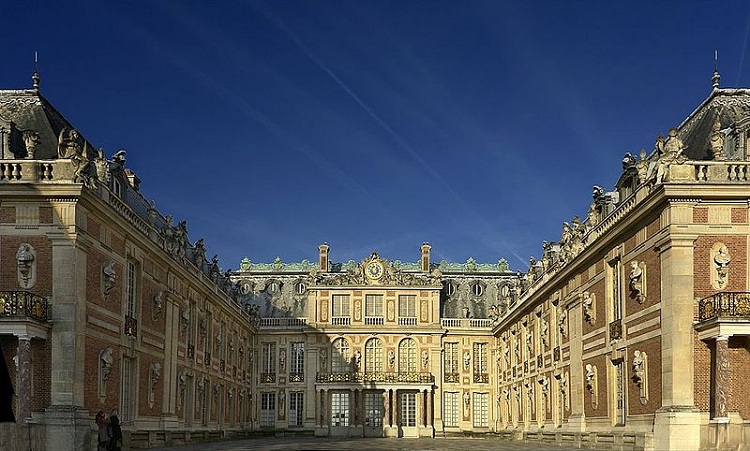
French ministers lived and enacted policies from the lush Chateau Versailles, though they were heavily guarded by blue and orange coated Dutch guards and spies.
 To encourage solidarity, the Dutch had renamed France, Flanders and the Netherlands the Atlantic Federation of States. Westphalia, Hannover and Portugal had also come under this umbrella, (without their constitution) and the head of the federation for the sake of impartial neutrality had been set up in London (even though London at the behest of King William the Third and Lord Field Marshal Ouwerkerk (known in London as Overkirk) heavily favoured the Dutch.)
To encourage solidarity, the Dutch had renamed France, Flanders and the Netherlands the Atlantic Federation of States. Westphalia, Hannover and Portugal had also come under this umbrella, (without their constitution) and the head of the federation for the sake of impartial neutrality had been set up in London (even though London at the behest of King William the Third and Lord Field Marshal Ouwerkerk (known in London as Overkirk) heavily favoured the Dutch.)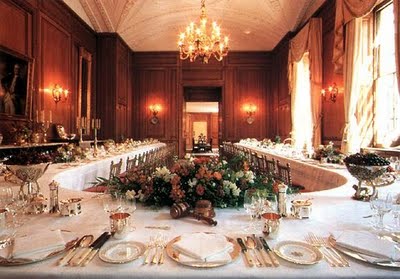
Ouwerkerk's home of 10 downing street in London become the neutral meeting place for the Atlantic Federation of States.
 By contrast, the great monarchies of Europe had continued with their wars unabated. While the Prussians had joined the war against the Westphalians prior to the formation of the federation (and thus was only at war with Westphalia), the Dutch were forced to encircle Cologne to prevent their German allies from falling. Claiming Cologne was technically under siege, and that they therefore had first right to the invested city, the Prussians could not invest the city themselves without first breaking through the Dutch, and that meant going to war with the powerful Federation, and their British allies. Despite technically being in a state of siege, the Westphalians managed to “sneak” a great deal of supplies and trade to and from the Dutch.
By contrast, the great monarchies of Europe had continued with their wars unabated. While the Prussians had joined the war against the Westphalians prior to the formation of the federation (and thus was only at war with Westphalia), the Dutch were forced to encircle Cologne to prevent their German allies from falling. Claiming Cologne was technically under siege, and that they therefore had first right to the invested city, the Prussians could not invest the city themselves without first breaking through the Dutch, and that meant going to war with the powerful Federation, and their British allies. Despite technically being in a state of siege, the Westphalians managed to “sneak” a great deal of supplies and trade to and from the Dutch.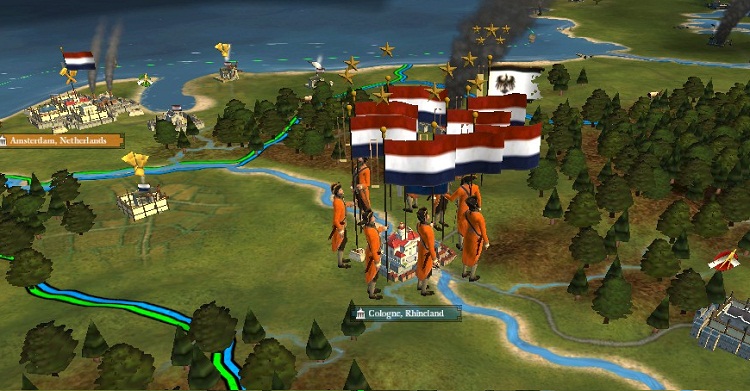
The Dutch "siege of Westphalia" caused considerable tension between Prussia and the United Provinces, and also was a cause of dissent among the Westphalian populace, who were opposed to foreign troops on their soil.
 To the North in the Baltics, Sweden had become the singular power. Pushing the Danish monarchy to the tiny island of Iceland, they had taken over everything north of the Baltic Sea, as well as St. Petersburg and Denmark on the mainland. They were poised over Hannover, and the Dutch had to consider investing List as they had Cologne. The military kind Karl XII of Sweden, currently in a safe position against her Russian Adversaries was checked only in the west by the Dutch and English. However, with their many colonies abroad, neither The United Provinces nor Great Britain had the fleets at home to deal with the Swedish navy should war be declared, leaving the Swedish armies with a distinct advantage in maneuverability.
To the North in the Baltics, Sweden had become the singular power. Pushing the Danish monarchy to the tiny island of Iceland, they had taken over everything north of the Baltic Sea, as well as St. Petersburg and Denmark on the mainland. They were poised over Hannover, and the Dutch had to consider investing List as they had Cologne. The military kind Karl XII of Sweden, currently in a safe position against her Russian Adversaries was checked only in the west by the Dutch and English. However, with their many colonies abroad, neither The United Provinces nor Great Britain had the fleets at home to deal with the Swedish navy should war be declared, leaving the Swedish armies with a distinct advantage in maneuverability.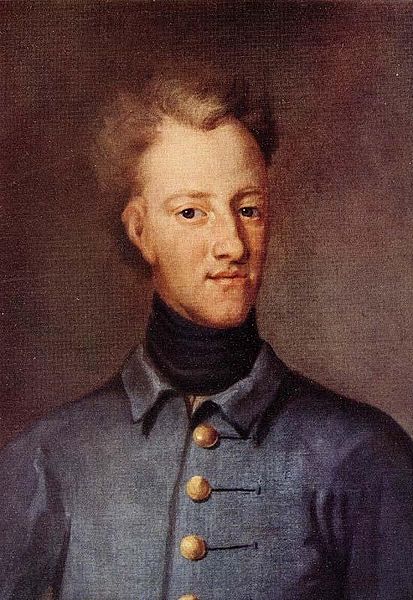
Karl XII, King of Sweden.
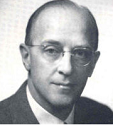 In Central Europe, the Prussians, Polish and Austrians all vied for domination. The Prussians, losing valuable time in the West against a peaceful Dutch army should have marched south towards Vienna instead, taking Dresden and Prague to fund a continued war against the Austrians and Polish. Friedrich I, king in Prussia however, was not a war like leader, and was only invested in these wars to save face in the eyes of his kingdom, which had rumoured that behind his bureaucratic trappings, he was a weak ruler. Ultimately, this may have been true. Though Prussia was well run, and their coffers had been smartly spent, the army they had managed to squeeze from their limited funding was run about and poorly administered. The Prussians could not have been more different than the Swedes to their North.
In Central Europe, the Prussians, Polish and Austrians all vied for domination. The Prussians, losing valuable time in the West against a peaceful Dutch army should have marched south towards Vienna instead, taking Dresden and Prague to fund a continued war against the Austrians and Polish. Friedrich I, king in Prussia however, was not a war like leader, and was only invested in these wars to save face in the eyes of his kingdom, which had rumoured that behind his bureaucratic trappings, he was a weak ruler. Ultimately, this may have been true. Though Prussia was well run, and their coffers had been smartly spent, the army they had managed to squeeze from their limited funding was run about and poorly administered. The Prussians could not have been more different than the Swedes to their North.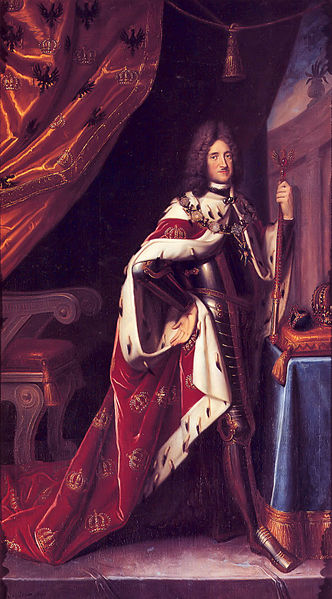
Friedrich I, King in Prussia
 Meanwhile, the Austrians and Polish continued to trade blows to one another across their frontiers. In the commotion, Bavaria and Saxony had already been annexed, traded and contested by those three Central powers many times. Their original government had been destroyed, and their people sent adrift in an emerging united Germany. Bavaria would re-emerge nearly 10 years later, but would remain in the shadow of Prussian, Austrian and Polish dominion. Despite being of completely different stature and demeanor, Augustus II and Leopold I were very similar rulers. Patrons of art, Leopold ensured music would flourish in Vienna, while Augustus spent a great deal of money on architecture. Both were pious Catholics (Leopold had thought he would be a bishop before his older brother had died.) and neither were in a truly powerful, independent position. However, with shows of strength from North, East and West, the dominance and solidarity of a unified German Empire incited them into constant conflict.
Meanwhile, the Austrians and Polish continued to trade blows to one another across their frontiers. In the commotion, Bavaria and Saxony had already been annexed, traded and contested by those three Central powers many times. Their original government had been destroyed, and their people sent adrift in an emerging united Germany. Bavaria would re-emerge nearly 10 years later, but would remain in the shadow of Prussian, Austrian and Polish dominion. Despite being of completely different stature and demeanor, Augustus II and Leopold I were very similar rulers. Patrons of art, Leopold ensured music would flourish in Vienna, while Augustus spent a great deal of money on architecture. Both were pious Catholics (Leopold had thought he would be a bishop before his older brother had died.) and neither were in a truly powerful, independent position. However, with shows of strength from North, East and West, the dominance and solidarity of a unified German Empire incited them into constant conflict.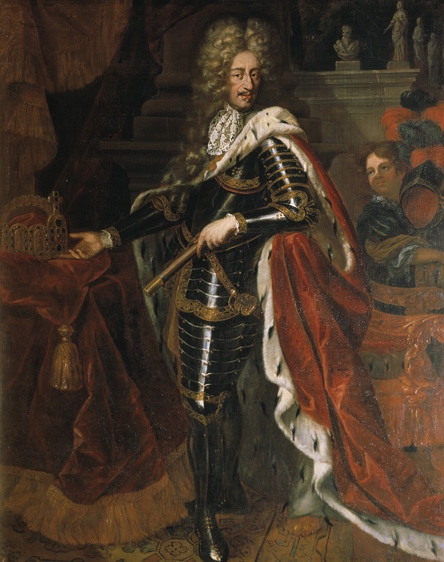
Leopold I, Emperor of Austria.
 This became the German unification crisis. All the powers of Germany sans Hannover and Westphalia, part of the Western Atlantic Federation, innately knew that they would need to form a singular German nation to survive and retain their status as a great power. Their war over the title however, was tearing them apart.
This became the German unification crisis. All the powers of Germany sans Hannover and Westphalia, part of the Western Atlantic Federation, innately knew that they would need to form a singular German nation to survive and retain their status as a great power. Their war over the title however, was tearing them apart.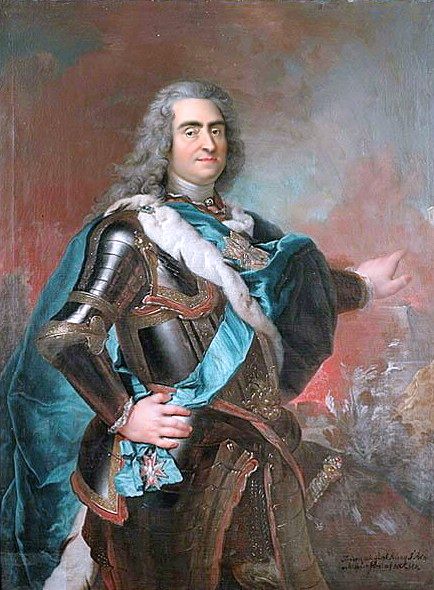
Auguste II, King of Poland.
 Complicated further was the death of Leopold in 1709, and the death of his son fighting the Polish in Saxony in 1708. His granddaughter, Empress Maria Theresa I was far less experienced than Charles would have been, but she was young and motivated, striving wherever she could to strengthen the old Austrian Empire. One of the nations she turned to was the United Provinces. Paying what little funds she could, she had purchased for a humble sum what technology the Dutch ambitiously had tried to sell to her grandfather for next to nothing. Despite her promising start, Maria Theresa had no formal education in matters of statesmanship, and certainly had never learned anything in the manner of conducting a war. Many despaired that the Austrian Empire would crumble completely.
Complicated further was the death of Leopold in 1709, and the death of his son fighting the Polish in Saxony in 1708. His granddaughter, Empress Maria Theresa I was far less experienced than Charles would have been, but she was young and motivated, striving wherever she could to strengthen the old Austrian Empire. One of the nations she turned to was the United Provinces. Paying what little funds she could, she had purchased for a humble sum what technology the Dutch ambitiously had tried to sell to her grandfather for next to nothing. Despite her promising start, Maria Theresa had no formal education in matters of statesmanship, and certainly had never learned anything in the manner of conducting a war. Many despaired that the Austrian Empire would crumble completely.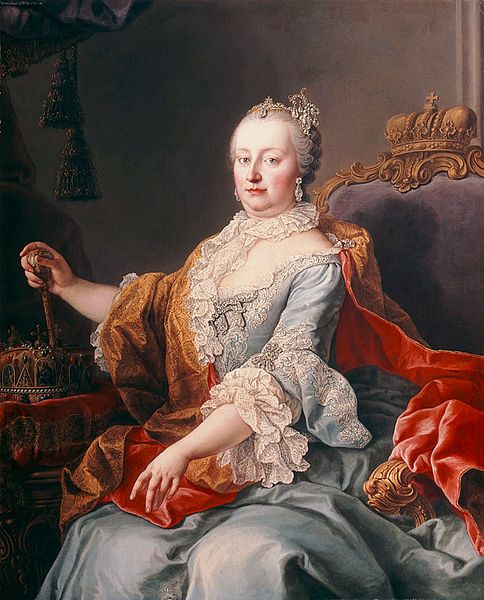
Maria Theresa I, Empress of Austria much later in her life.
 In Amsterdam, this had gone from an issue of no concern whatsoever, to one of slight consternation. The Ottoman Empire was one of their wealthiest trade partners, along with Sweden, the Marathas and Britain. The Austrians and Polish governments were not in a position to do business with the Dutch at all at this time. However, this threat that the Catholic and Protestant centers of Christianity may fall prey to an ever stronger Eastern Orthodox, or worse still, Muslim threat from the East had many worried about the stability in the middle east, as they knew a war of ideology across the region, a new crusade perhaps would demolish trade across numerous theaters.
In Amsterdam, this had gone from an issue of no concern whatsoever, to one of slight consternation. The Ottoman Empire was one of their wealthiest trade partners, along with Sweden, the Marathas and Britain. The Austrians and Polish governments were not in a position to do business with the Dutch at all at this time. However, this threat that the Catholic and Protestant centers of Christianity may fall prey to an ever stronger Eastern Orthodox, or worse still, Muslim threat from the East had many worried about the stability in the middle east, as they knew a war of ideology across the region, a new crusade perhaps would demolish trade across numerous theaters.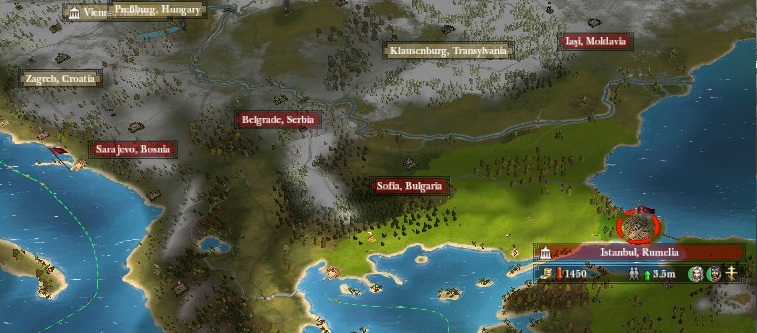
Trade poured in and out of Istanbul, and the funds of that trade were put to expanding into Europe.
 Worse still, the Dutch trade fleets had finally managed to engage in a trade agreement with the Prussians at considerable expense, the first central German power to allow Dutch trade. With the prospect of losing both their Ottoman trade and fledgling German market, the Dutch watched eastward with bated breath.
Worse still, the Dutch trade fleets had finally managed to engage in a trade agreement with the Prussians at considerable expense, the first central German power to allow Dutch trade. With the prospect of losing both their Ottoman trade and fledgling German market, the Dutch watched eastward with bated breath.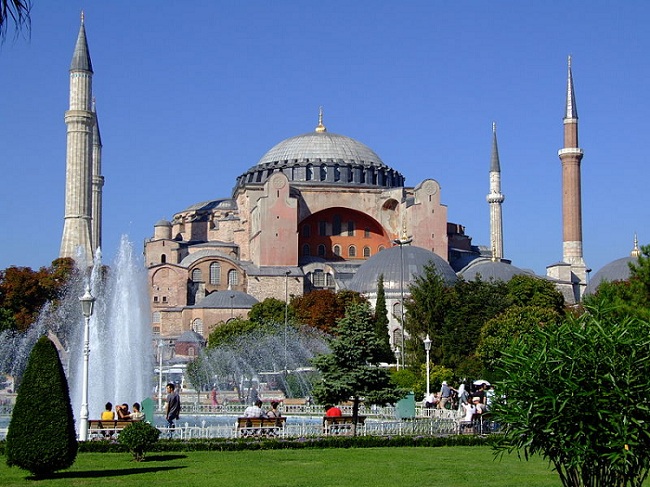
The splendor of Istanbul overawed the Dutch traders.
 Other electors, kings and states in central Eurpoe were pulled apart by the three great central European nations, and it seemed that all were doomed to pulling themselves apart while east and west of them, larger, more powerful nations were forged, be it the Dutch controlled Federation to the west, or the massive Ottoman Empire expanding in the East. Indeed, by this time, the Ottomans had already taken a small portion of the Austrian Empire. The ever present threat of Ottoman rule had many Christian nations on the edge, but with the only opposition to the Muslims engaged in internal quarrels, their invasion seemed inevitable.
Other electors, kings and states in central Eurpoe were pulled apart by the three great central European nations, and it seemed that all were doomed to pulling themselves apart while east and west of them, larger, more powerful nations were forged, be it the Dutch controlled Federation to the west, or the massive Ottoman Empire expanding in the East. Indeed, by this time, the Ottomans had already taken a small portion of the Austrian Empire. The ever present threat of Ottoman rule had many Christian nations on the edge, but with the only opposition to the Muslims engaged in internal quarrels, their invasion seemed inevitable.
Central Europe as of the Dutch election. Borders changed due to war every year. Map printing presses were invented partly to accommodate this.
 Even further east, the Dutch had finally cut ties to the crippled Mughal Empire. Their conquerors, the Maratha Confederacy, dominating all of India with a startling rapidity, had become an immense trade partner to the Dutch. Both a rival in trade of teas, spices and goods from the Middle East, and a key spender of Dutch commodities, Amsterdam looked very carefully to the emerging power of India. Far beyond the political reach of the European powers, trade from Dejima brought exotic goods in from the isolationist Japanese, whom were only willing to do any trade at all with the Western Atlantic Federation. The Dutch mainly traded sugar and books, receiving silk and pottery in return.
Even further east, the Dutch had finally cut ties to the crippled Mughal Empire. Their conquerors, the Maratha Confederacy, dominating all of India with a startling rapidity, had become an immense trade partner to the Dutch. Both a rival in trade of teas, spices and goods from the Middle East, and a key spender of Dutch commodities, Amsterdam looked very carefully to the emerging power of India. Far beyond the political reach of the European powers, trade from Dejima brought exotic goods in from the isolationist Japanese, whom were only willing to do any trade at all with the Western Atlantic Federation. The Dutch mainly traded sugar and books, receiving silk and pottery in return. Finally, the quiet, isolationist English in Britain and the Americas. Silently amassing a great fortune, the English were mainly remaining well out of any issues that were had in the mainland of Europe, even going so far as to spare the small, powerless colonies of a nearly defeated Spain. The status quo certainly favoured the English in the meantime, with a powerful ally in the Dutch, and no hope of a unified central Europe, their position seemed unassailable.
Finally, the quiet, isolationist English in Britain and the Americas. Silently amassing a great fortune, the English were mainly remaining well out of any issues that were had in the mainland of Europe, even going so far as to spare the small, powerless colonies of a nearly defeated Spain. The status quo certainly favoured the English in the meantime, with a powerful ally in the Dutch, and no hope of a unified central Europe, their position seemed unassailable. To this end, much of their annual tax was expended on improving their navy. Ships were decommissioned almost as quickly as they were put into commission, each larger, heavier, faster and deadlier than the last. They were the first in this era to invent a ship with over 70 guns. Aside from her navies, the British were the primary competition for the Dutch, sharing many of the same sea lanes and trading partners, both were fierce economic competitors.
To this end, much of their annual tax was expended on improving their navy. Ships were decommissioned almost as quickly as they were put into commission, each larger, heavier, faster and deadlier than the last. They were the first in this era to invent a ship with over 70 guns. Aside from her navies, the British were the primary competition for the Dutch, sharing many of the same sea lanes and trading partners, both were fierce economic competitors.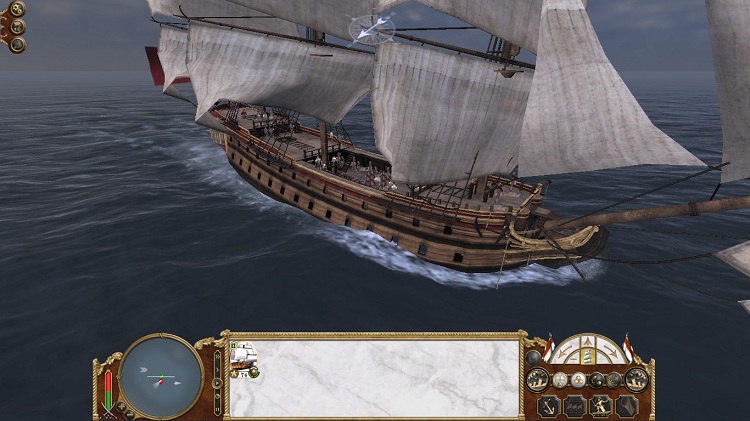
A British ship of the line. These were a common sight in the Atlantic. Their main channel fleet had close to a half dozen of these behemoths.
 It could be said that at this time, the United Provinces, and the Western Atlantic Federation were the greatest power in the world. However, they were not without strong adversaries in the world stage. The possibility of a unified Germany. The powerful, well positioned Ottomans, the conquering Marathas and the sea fairing British all had fair claim to the title.
It could be said that at this time, the United Provinces, and the Western Atlantic Federation were the greatest power in the world. However, they were not without strong adversaries in the world stage. The possibility of a unified Germany. The powerful, well positioned Ottomans, the conquering Marathas and the sea fairing British all had fair claim to the title. And that was the state of the world by 1709. However, marking an end to these peaceful years, Willem Gansevoort, once again reporting to Spain as their supposed spy, had seen Spain’s army gathering around Madrid, and marching in force northward to the French border. Ouwerkerk was entangled in France and Waldeck was worried that the large, professional Spanish army would weaken the massive Parisian militia too greatly, (thus opening the way for further, potentially more deadly rebellions incited from Alsace-Lorraine.) and so the newly formed professional army under Christiaan van Waldeck marched south towards the border. Ouwerkerk, ready to repel them if Waldeck was beaten, sent the conscripted troops south to join him. The militia couldn’t be sent as far south as Spain, even the militia raised in France, lest they find themselves too far from home and their work.
And that was the state of the world by 1709. However, marking an end to these peaceful years, Willem Gansevoort, once again reporting to Spain as their supposed spy, had seen Spain’s army gathering around Madrid, and marching in force northward to the French border. Ouwerkerk was entangled in France and Waldeck was worried that the large, professional Spanish army would weaken the massive Parisian militia too greatly, (thus opening the way for further, potentially more deadly rebellions incited from Alsace-Lorraine.) and so the newly formed professional army under Christiaan van Waldeck marched south towards the border. Ouwerkerk, ready to repel them if Waldeck was beaten, sent the conscripted troops south to join him. The militia couldn’t be sent as far south as Spain, even the militia raised in France, lest they find themselves too far from home and their work.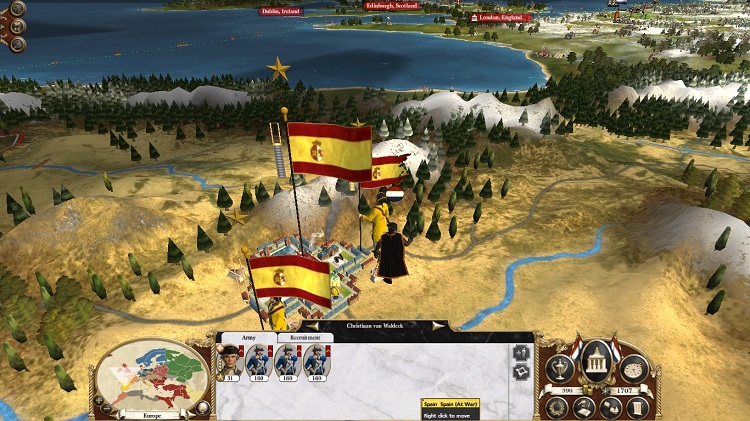
Ganesvoort keeping a very careful watch on the Spanish armies.
 With him were a dozen new cannons. Unlike the massive demi cannon that they had previously used, these 12 pound cannons (referring to the weight of their shot) on well made carriages could be rapidly wheeled about a battle field, letting the artillery corpse prepare and fire during a battle. Well tested guns from Amsterdam’s main artillery, they would be a key asset against the outdated Spanish moyenne.
With him were a dozen new cannons. Unlike the massive demi cannon that they had previously used, these 12 pound cannons (referring to the weight of their shot) on well made carriages could be rapidly wheeled about a battle field, letting the artillery corpse prepare and fire during a battle. Well tested guns from Amsterdam’s main artillery, they would be a key asset against the outdated Spanish moyenne.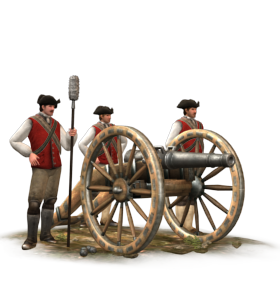
A 12 pound cannon was light enough to be dragged around the battlefield quickly by horse pulled carriages and could be set up in moments.
 Key as well was intelligence from Ganesvoort. Tailing the Spanish army under the auspices as an informant for the Spanish who was well versed with the French countryside, he was able to see the entire scope of the Spanish deployment. Left virtually unguarded, the Spanish had intended to use the full might of their army to liberate France, and from there, crush the rebellious Dutch. It was an all or nothing attack, similar in daring to the United Provinces famed siege of Paris, but lacking entirely in its execution. Their troops were simply pressed forward to attack in the blind hope of victory.
Key as well was intelligence from Ganesvoort. Tailing the Spanish army under the auspices as an informant for the Spanish who was well versed with the French countryside, he was able to see the entire scope of the Spanish deployment. Left virtually unguarded, the Spanish had intended to use the full might of their army to liberate France, and from there, crush the rebellious Dutch. It was an all or nothing attack, similar in daring to the United Provinces famed siege of Paris, but lacking entirely in its execution. Their troops were simply pressed forward to attack in the blind hope of victory.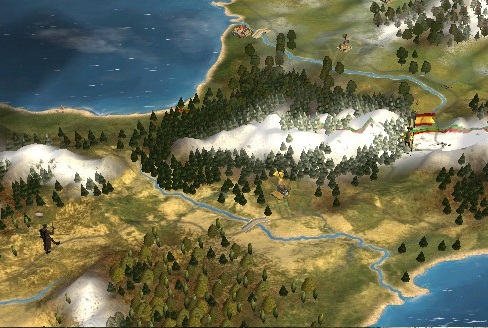
Ganesvoort trailing the Spanish army in their supply train.
 But a lack of planning would not diminish the danger the Spanish army represented. Slightly outnumbering Waldeck’s regular army, and with Ouwerkerk pinned down repressing the French, the Spanish army could potentially have beaten them in turn. Indeed, Ganesvoort’s constant reports indicated the Spanish army was attempting to evade Waldeck, likely so they could take Paris and Ouwerkerk’s army, turn around the defenses and use the city fortifications to defeat the remaining Dutch army.
But a lack of planning would not diminish the danger the Spanish army represented. Slightly outnumbering Waldeck’s regular army, and with Ouwerkerk pinned down repressing the French, the Spanish army could potentially have beaten them in turn. Indeed, Ganesvoort’s constant reports indicated the Spanish army was attempting to evade Waldeck, likely so they could take Paris and Ouwerkerk’s army, turn around the defenses and use the city fortifications to defeat the remaining Dutch army. In our next broadcast, we will be discussing the defense of France, and the Dutch counter attack into Spain. This has been the fifth look into the second 80 years war, presented by David Stephenson. Next, we have a special guest, the Ambassador from Iran Arash Farid will be discussing Western intervention in the middle east. In half an hour, we will be presenting world news. If you want news of the current war in the Middle East please channel in to BBC radio 1. David Stephenson will be presenting more on the 80 years war in 3 days.
In our next broadcast, we will be discussing the defense of France, and the Dutch counter attack into Spain. This has been the fifth look into the second 80 years war, presented by David Stephenson. Next, we have a special guest, the Ambassador from Iran Arash Farid will be discussing Western intervention in the middle east. In half an hour, we will be presenting world news. If you want news of the current war in the Middle East please channel in to BBC radio 1. David Stephenson will be presenting more on the 80 years war in 3 days.Please be advised, our lead editor has been away with flu. Any spelling or grammatical errors will be reconciled upon his return. Thank you for your understanding.